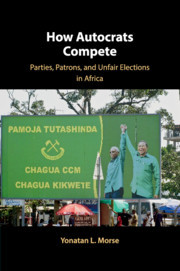How Autocrats Compete Parties, Patrons, and Unfair Elections in Africa
Langue : Anglais
Auteur : Morse Yonatan L.

Explains how autocrats compete in unfair elections in Africa and highlights the strengths and weaknesses of modern authoritarianism.
Most autocrats now hold unfair elections, yet how they compete in them and manipulate them differs greatly. How Autocrats Compete advances a theory that explains variation in electoral authoritarian competition. Using case studies of Tanzania, Cameroon, and Kenya, along with broader comparisons from Africa, it finds that the kind of relationships autocrats foster with supporters and external actors matters greatly during elections. When autocrats can depend on credible ruling parties that provide elites with a level playing field and commit to wider constituencies, they are more certain in their own support and can compete in elections with less manipulation. Shelter from international pressure further helps autocrats deploy a wider range of coercive tools when necessary. Combining in-depth field research, within-case statistics, and cross-regional comparisons, Morse fills a gap in the literature by focusing on important variation in authoritarian institution building and international patronage. Understanding how autocrats compete sheds light on the comparative resilience and durability of modern authoritarianism.
1. The puzzle of electoral authoritarian competition; 2. Ruling parties, international patrons, and electoral authoritarian competition; 3. Electoral authoritarian competition and the African experience; 4. The origins and structure of ruling parties in Tanzania, Cameroon, and Kenya; 5. Ruling party credibility and the management of elite competition; 6. Ruling party credibility and the sources of voter support; 7. The electoral consequences of international patronage; 8. Authoritarian competition in Africa's former single-party regimes; Conclusions. The comparative study of electoral authoritarianism; Appendix I. Electoral authoritarian competition in Africa; Appendix II. Typological theory coding and scores.
Yonatan L. Morse is Assistant Professor of political science at the University of Connecticut. He is the author of articles on democracy, authoritarianism, and African politics that have appeared in the journals World Politics, Comparative Politics, Democratization, Qualitative Research, and International Political Science Review. His dissertation was awarded the Harold N. Glassman Award in Social Sciences from Georgetown University. He has also consulted for various government institutions and written for the Washington Post and the blog Presidential Power.
Date de parution : 12-2020
Ouvrage de 358 p.
15.2x22.9 cm
Date de parution : 11-2018
Ouvrage de 352 p.
15.5x23.4 cm
Thème de How Autocrats Compete :
© 2024 LAVOISIER S.A.S.



